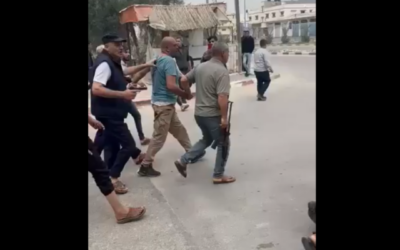
Gazan Clan Executes Hamas Member for Killing Family Member
Members of a prominent local clan publicly executed an individual accused of being a Hamas operative, following the death of one of their own relatives. The execution, which took place in the city of Deir al-Balah in central Gaza, demonstrates both the deepening internal tensions within Palestinian society and the weakening grip of Hamas amidst the ongoing war with Israel.
According to reports, the Abu Samra family carried out the execution after accusing the man—believed to be affiliated with Hamas—of fatally shooting Abdulrahman Sha’aban Abu Samra. The victim was reportedly waiting in line for humanitarian flour aid when he was gunned down. Such lines have become common across Gaza in recent months as civilians struggle with widespread shortages of basic necessities, the result of continued military conflict and the collapse of civil infrastructure.
Footage of the execution was circulated widely on Palestinian social media, showing the accused kneeling before being shot multiple times in front of onlookers. The act was not carried out in secrecy but rather as a public display of the family’s intent to take justice into their own hands. The family later issued a statement declaring that they had carried out a form of tribal justice, stating that the Gaza government, under Hamas, had failed to bring the perpetrator to justice.
This incident has drawn significant attention not only for its brutality, but for what it reveals about the changing power dynamics in the Gaza Strip. Traditionally, powerful extended families—known as hamulot—have operated with a degree of autonomy. Many of these clans are structured with defined leadership, often headed by a mukhtar or elder, and they typically maintain their own mechanisms of conflict resolution, especially in times of state or institutional collapse.
The Abu Samra clan is one such family, long established in central Gaza. Like many other clans, they have members involved in various sectors of local society, including commerce and civil affairs. While some clans have aligned with Hamas for mutual benefit, others have remained independent or even opposed to Hamas rule. This growing rift has become more pronounced in recent months as Gaza’s civilian population faces unprecedented hardship.
Since the outbreak of the current war on October 7th, when Hamas launched a deadly attack on southern Israel, Gaza has been plunged into ever-deepening turmoil. Israel’s military response has devastated infrastructure, strained resources, and left the civilian population in a state of crisis. Within this chaotic environment, the authority of Hamas has been tested, not only by the external pressures of war but also by increasing internal unrest.
In recent weeks, rare public protests have been reported in several areas of Gaza. Civilians, including women and children, have gathered to voice grievances over the lack of food, electricity, and basic services. In some cases, anger has been directed explicitly at Hamas, whom many blame for bringing destruction upon the Strip and for failing to protect its people or provide adequate aid. There have also been allegations of Hamas officials hoarding humanitarian aid and using harsh methods to silence dissent, including abductions and extrajudicial punishments.
This breakdown of public trust in Hamas has emboldened families like the Abu Samras to take justice into their own hands. While Hamas has maintained a tight grip on Gaza for nearly two decades, ruling through a combination of religious legitimacy and force, the current crisis appears to be eroding that control. Internal rivalries, resentment over mismanagement, and the collapse of civil services are combining to form a volatile environment where clan-based justice is reemerging as a dominant force.
The execution in Deir al-Balah may be one of the most public expressions of this shift, but it is unlikely to be the last. As Gaza continues to reel under the combined weight of war, famine, and political chaos, the risk of civil fragmentation and tribal retribution increases. The ramifications of this breakdown in order could be profound, both for Gaza’s future governance and for the broader conflict between Israel and Palestinian factions.
While the Abu Samra family has declared closure in their case, Hamas has yet to officially respond to the incident. Whether the organization will seek to reassert its authority through retaliation or accommodate tribal justice in a bid to maintain control remains to be seen.